
Electronic english version since 2022 |
The newspaper was founded in November 1957
| |
|
Number 42 (4740) |
Conferences
In Dubna - on current issues of radiobiology
On 16 - 18 October, the traditional Conference "Current issues of radiation biology. Modification of radiation induced effects" was held organized by the Scientific Council of the Russian Academy of Sciences on Radiobiology, the Radiobiological Society of the Russian Academy of Sciences and LRB JINR.
The leading specialists from the Federal Medical Biophysical Centre named after A. I. Burnazyan, the Institute of Biomedical Problems of the Russian Academy of Sciences, the Saint Petersburg State Chemical Pharmaceutical University, the Obninsk Research Institute of Radiology and Agroecology and the Tsyb Medical Radiological Research Centre, the Ural Research Centre for Radiation Medicine (Chelyabinsk), the Seversk Biophysical Research Centre, the Research Institute of Medical Genetics (Tomsk), the employees of LRB and the scientific centres of Azerbaijan, Armenia, Belarus, Russia discussed the fundamentals of searching for radioprotective substances aimed at reducing the level of damaging effects of radiation; fundamental aspects of the modifying effect of agents of different origin on animal and plant cells; issues of radiation safety of space flights; improving radiation therapy for tumors.
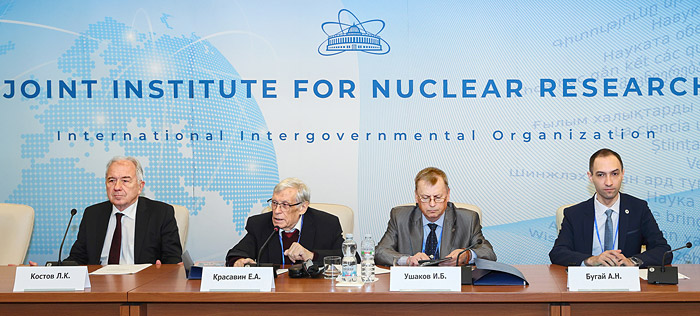
Chairman of the RAS Council on Radiobiology, Scientific Leader of the Laboratory of Radiation Biology, Corresponding Member of the RAS Evgeny Krasavin opened the Conference. He emphasized that the main goal of the meeting of leading specialists in the field of radiobiology is development of new approaches to designing advanced radiomodifiers for practical use in various areas of radiation protection, medicine and space research.
The participants of the Conference and the numerous students of the Department of Biophysics of the Dubna State University were welcomed by JINR Vice-Director Latchesar Kostov, LRB Director Alexander Bugay; the greeting of Head of the Federal Medical and Biological Agency of the Russian Federation V.I.Skvortsova was read by President of the RAS Radiobiological Society Igor Ushakov. Chairman of the Scientific Council of the Russian Academy of Sciences for Radiobiology Evgeny Krasavin, welcoming the participants, recalled the contribution to the area of its founders - L.H.Gray, G.Patt and E.Cronkite, L.H.Eidus, E.F.Romantsev, S.E.Bresler, S.P.Yarmolenko. And for the Institute's media, he said,
"We have gathered here the leading specialists from many centres to exchange opinions on what we can do in the implementation of new approaches to protect against the harmful effects of ionizing radiation. This is one aspect and the other is development of new radiomodifiers to increase the efficiency of radiation exposure to tumor cells in radiation therapy for oncological diseases. Our main task is to discuss and to build a vector of further movement in the development of new techniques of using ionizing radiation for various purposes together with the high-level specialists gathered here."
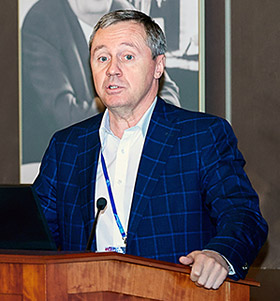 |
| А.N.Grebenyuk |
"Fears are in vain. A good radioprotector B-190 is produced, it is available in specialized first aid kits and in Rosatom, as well as in law enforcement agencies. As for the essential medicines that are necessary for the population in case of radiation accidents of any genesis, military or peaceful (technogenic accident), the drugs are also produced: potassium iodide is available in any pharmacy, there is ferrocin, pentacin. The probability of a great radiation incident with the defeat of a large number of people, what happened in Hiroshima and Nagasaki, is minimal. As for some accidents at nuclear power facilities, there is such a probability, yet it is possible to affect a very limited number of people. If we talk about the development of drugs, from my point of view, it is necessary to shift the emphasis from drugs that were used before irradiation, since this event is unpredictable, to drugs that will be used in the early stages of post-radiation exposure. There are such drugs, radiomitigators, there are many of them, the modes of their action are quite clear and their development does not require any significant investments and scientific research,
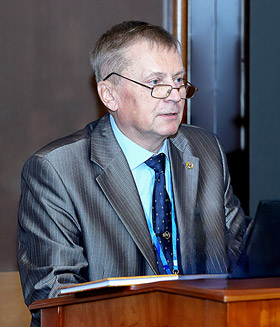 |
| I.B.Ushakov |
I.B.Ushakov (FMBC) presented a collection published on the 90th anniversary of the birth of the outstanding scientist in the field of biochemical, molecular kinetics and radiobiology E.B.Burlakova that had more than once participated in these conferences,
"Elena Borisovna devoted her entire life to radiobiology; she passed away eight years ago and we felt it necessary to celebrate her 90th birthday. I knew Elena Borisovna personally, I met with her as a young man, I reported her paper submitted for the USSR Government Prize. She understood the not very close to her and rather complicated pharmacological work on defense issues, which in the 1980s we were engaged in."
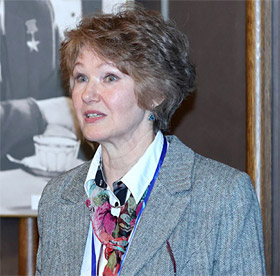 |
| М.V.Filimonova |
"This is a very interesting scientific research area that can be called the search for radio-modifiers for completely different needs and it can be applied to different groups of society. I can say for sure that there is a rather large field of possibilities here. I showed several groups of radio-modifiers in my report and each group can have many more and countless combinations of them can be invented and researched and the most appropriate ones can be found in terms of safety and efficiency. And to apply them for different purposes: as radiation safety, having in mind the interests of the country, the military and for use in medicine. In medicine, this is combined treatment of cancer, when radiation therapy is used along with surgery and chemotherapy. The percentage of radiation damage that can develop months and years after the end of radiation therapy is very high. It is impossible to search for such radiomodifiers without an instrumental base - these are research facilities and expensive reagents, without a methodological base - these are prototypes and without funding. I am sure that a sufficient cohort of young people would like to be involved in radiation research, I see it in Obninsk and I think that in the glorious city of Dubna, to which I have great piety and affection, there are many motivated young people."
In short, are the prospects still optimistic?
- They are optimistic provided that there is at least some interest of those who the funding depends on. In any country, it cannot be only government agencies or some kind of "fat purses", but a combination of both. In Russia, these are state tasks that scientific and medical institutions receive, state grants and RSF grants and I would like to see more private grants (there have been such grants in our recent history but today, I don't hear about them) and private sponsors, for example, pharmaceutical companies or patrons of the arts.
It would be possible if science were popularized, if our oligarchs heard about the excellent scientific results that are more and more day by day. And if such assistance of private entrepreneurs was somehow encouraged by the state, it would further stimulate them. It is important to create such contacts. In my report, I cited the example of a team of colleagues from Pushchino with the popular science lecture Science Talks for a reason: they talk about science so easily and in an interesting way and find time for it and they are not novice scientists, some of them are heads of laboratories. Popularization at this level, it seems to me, is a multifaceted benefit for society as a whole, for its health. I am convinced of it and I would like to hope that it will develop in our country.
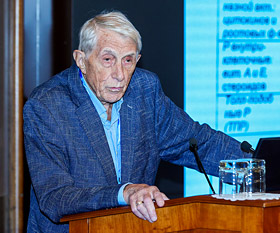 |
| L.M.Rozhdestvensky |
- I believe that Russian radiobiology goes through a crisis, in particular, the section of it that deals with the development of radioprotective substances. We can say that there are external reasons: the funding of science has decreased and in the late 1990s, the number of irradiation facilities was drastically reduced and this is one of the main tools of research in our field. In my time, I worked a lot with the drug betaleukin, I was a member of the group organized by our main "cytokine specialists" - S.A.Ketlinsky and A.S.Simbirtsev. They worked at the Institute of Highly Pure Biopreparations in St. Petersburg and developed a domestic recombinant preparation of betaleikin. It showed good radioprotective properties, especially in dogs, as the closest animal species to humans. Moreover, they organized a large team of specialists from different institutes of the country, carried out research, this paper was awarded the Government Prize for 2006. They organized special production at their Institute, started to produce betaleikin and made it possible to buy it in an ordinary pharmacy. This is an extraordinary thing for a radioprotective drug. And suddenly, we find out that its production has been stopped under some far-fetched pretext. Such things not only do not contribute to the development of science, but on the contrary.
It is good that some centres have survived. In our FMBC named after A.I.Burnazyan, I am Head of the Laboratory of Pharmacology of Radioprotective Substances. We try to look for some other ways but the funding is not enough to implement major projects, although there are reserves. Moreover, I think that today, it is not so important to find some new drugs, it is almost impossible, for in the 1970-1980s, these investigations were very widely implemented, we studied everything we could. And really effective drugs were immediately found and further research did not give much, although betaleikin was produced that was even used to reduce the negative effects of radiation therapy for cancer. I think we should currently focus more on the combination of different drugs that sometimes has a greater effect than using them individually. Some things radiobiology can take from general clinical practice, for example, immersion in a state of artificial coma, hypothermia, when the body goes into a state of hypobiosis, which its vital activity is reduced in. All processes are suspended, including development of consequences of ionizing radiation and doctors, for example, get time to grow stem cells from the patient's bone marrow.
All radioprotective drugs are divided into two groups: those that are effective when used before radiation and those that are effective even after radiation. We have both. And it is very important here if we learn how to stop the development of the radiation process using the techniques I have mentioned. These are the approaches that interest me today.
How do you estimate the prospects?
- In the context of reduced funding, new ways should be found to move forward in confronting radiation damage. In addition, the political situation changes, talk about war with the use of nuclear weapons has resumed and in such a situation, it would be wrong not to prepare. Despite the difficulties, I believe that radiobiology that is necessary not only for this purpose, is also necessary from the point of view of preparation for such radiation lesions of the organism. Astronautics develops and as we go beyond the earth's atmosphere, the radiation danger increases. There is a danger of solar flares that are difficult to predict, it is also difficult to protect mechanically from them, radiobiology with the development of anti-radiation drugs should help. And we cannot exclude accidents, not necessarily as huge as Chernobyl. There is a possibility of unintended exposure. The state that has a developed nuclear industry, is simply obliged to develop ways to combat the possibility of sudden overexposure of a person.
"The Conference was a success," I.B.Ushakov summarized the preliminary results, "It was held at a good professional level, there were many young people, many interested participants. People are sincerely interested in radiobiology, there were a lot of interesting questions, I was glad to write down many of them. Now, I was talking to an employee of the St. Petersburg Institute of Nuclear Physics, we remembered the modes of irradiation, in this case, of the nervous system and today, there was a report on other tissues, today's section on therapeutic aspects - treatment of tumors and other diseases with the help of radiation confirmed that we expand the field of the Radiobiology Society. In short, a very interesting, fruitful conference leaves food for discussions, scheduling of future research and even for grants that can be submitted to RSF or other funds. Therefore, I am very excited to summarize the preliminary results and those proposals that were submitted in the draft decision, I will propose to send them not only to two departments of the Russian Academy of Sciences - Department of Biology, which the Radiobiology Society belongs to and Department of Medicine, but also to Department of Physiology and perhaps, of Agricultural Sciences, so that more departments of the Academy would learn about the scientific papers of the Council on Radiobiology and would get acquainted with the members of the Radiobiology Society. We will prepare the conference in two years and I think these three days of discussions at the Conference have been the most efficient and the most comprehensive ones since the Conference in 2021. Next year, we will try to increase the level of the Conference, if not to increase it, at least to maintain it."
A poster session of young scientists and contests for the best oral and poster reports were organized at the Conference. The winners and active participants of the sections were awarded diplomas and certificates, as well as got umbrellas with JINR symbols.
Olga TARANTINA,
photo by Igor LAPENKO